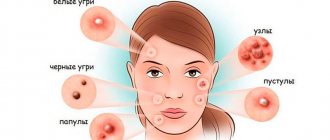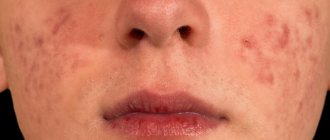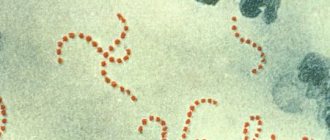What tests are prescribed for patients with acne if problems with the gastrointestinal tract are suspected?
To identify problems in the intestines, the gastroenterologist prescribes the following studies:
- Analysis for dysbacteriosis. Based on the research results, the specialist will determine the presence of pathogenic microflora that provokes the development of the inflammatory process. Based on the findings, this gastroenterologist will prescribe appropriate therapy. Drug effects on microflora are a long process that will not immediately produce results in the form of getting rid of acne. But this is a necessary measure, without which acne treatment may be ineffective.
- Gastroscopy. This method allows you to examine the condition of the stomach, in particular its mucous membrane. If the results of the study show the presence of foci of inflammation, ulcers, injuries, gastritis can be assumed. Due to the disease, the normal microflora of the stomach is disrupted, the colonization of pathogenic microorganisms increases, which can also lead to the development of acne.
- Blood tests. This type of research helps to identify pathologies of the liver, pancreas, and gall bladder.
Do you have allergies or intestinal dysbiosis?
Waking up in the morning, you looked in the mirror and saw bright spots of redness on your face and body, accompanied by itching. “Is this an allergy?” – you thought. “Where should I address this problem?” Of course, first of all, you will make an appointment with a dermatologist or allergist, who will definitely refer you to a specialist who deals with problems of digestion and the gastrointestinal tract - a gastroenterologist. According to many experts, most patients with signs of food allergies have certain diseases of the digestive system. According to statistics, chronic diseases of the digestive system precede the onset of food allergies in approximately 53% of patients, and develop after the appearance of allergy symptoms in 37% of patients. In other patients, symptoms of any gastrointestinal disease and an allergic reaction occur simultaneously, or manifestations of food allergies are not accompanied by obvious digestive disorders.
Increased permeability of the intestinal mucosa to allergens can occur as a result of certain hereditary and acquired disorders. For example, various nutritional disorders (increased consumption of animal fats compared to the consumption of vegetable fats, lack of easily digestible proteins in food, as well as vitamins, fasting), frequent stressful situations, alcohol abuse, heavy smoking - all this adversely affects the condition of the intestinal barrier.
Among the most common disorders in patients with food allergies are diseases of the liver and biliary tract, accompanied by a violation of the outflow of bile. Insufficient flow of bile into the intestine leads to disturbances in the digestion of food, changes in the barrier function of the intestinal epithelium and promotes the absorption of insufficiently cleaved protein molecules that have allergenic properties and can also cause pseudo-allergic reactions by stimulating the release of biologically active substances from target cells. It is pseudoallergic reactions that are most often observed in diseases of the liver (chronic hepatitis) and biliary tract (biliary dyskinesia, chronic cholecystocholangitis).
Many patients with various manifestations of food allergies are diagnosed with diseases of the gastroduodenal zone - chronic gastritis and (or) duodenitis, as well as peptic ulcers. In this case, the microbe Helicobacter pylori is very often detected in the stomach, which is now given great importance as the cause of inflammatory changes in the gastroduodenal zone and the formation of ulcers. Patients with Helicobacter pylori infection have a more severe course of some allergic diseases, in particular bronchial asthma, and other manifestations of allergies are also more common
Intestinal dysbiosis (dysbacteriosis) plays a major role in the development of allergic reactions in the digestive tract, skin and respiratory tract.
In healthy people, the large intestine normally contains a large number of different bacteria. For example, 1 g of cecal contents contains 2 billion microbes. Normal microflora of the large intestine is necessary to maintain homeostasis (constancy of the internal composition) of the body. The largest amount of normal microflora is represented by bifidobacteria and lactobacilli. The biologically active substances they secrete (bacterial modulins) stimulate the intestinal lymphoid apparatus, the synthesis of immunoglobulins, interferon, lysozyme - anti-infective protective agents, and reduce vascular permeability to toxic products of pathogenic and opportunistic microorganisms. In addition, normal intestinal microflora ensures the synthesis of various vitamins, biologically active substances that affect the function of not only the gastrointestinal tract, but also the liver, heart and many other organs. Normal intestinal microflora secretes hormonally active substances, compounds with antibiotic activity, and also stimulates the physiological activity of the intestine and ensures normal stool.
Intestinal dysbiosis is widespread, and there are a large number of factors contributing to its development. These include various nutritional disorders, in particular a deficiency of plant fiber in the diet, the predominance of refined carbohydrates and shelf-stable foods with the addition of all kinds of preservatives. Another important reason for the development of dysbiosis is the use of medications that affect the microbial landscape of the large intestine. These primarily include antibiotics and other antibacterial agents. But that’s not all: various occupational hazards, unfavorable sanitary and hygienic living conditions, including environmental changes, climatic and geographical influences (moving from temperate climate zones to hot countries and vice versa), as well as many diseases, especially infectious diseases of the gastrointestinal tract, contribute to the development of intestinal dysbiosis.
It should be remembered that intestinal dysbiosis not only affects the development of allergic reactions, but also contributes to a more severe course of many chronic and acute diseases of internal organs.
Particularly dangerous is the increased proliferation of microorganisms in the small intestine - the so-called bacterial overgrowth syndrome, which occurs when the normal motor activity of the intestine is disrupted for various reasons and the contents of the large intestine flow back into the small intestine. As a result, in the latter, the number of microorganisms increases thousands of times, reaching 1 million microbial bodies in 1 ml of intestinal contents. The negative effect of intestinal dysbiosis, in particular its effect on the development of food allergies, is noted even before manifestations of intestinal dysbiosis itself arise (stool disturbances, bloating and pain in the abdomen, etc.). During the development of dysbiosis, the content of normal bifido- and lactoflora in the colon decreases, the content of E. coli changes quantitatively and qualitatively, some microorganisms (in particular, staphylococci) acquire properties that are not characteristic of them normally - to carry out hemolysis (destruction of red blood cells), and in more In severe cases, pathogenic microorganisms, including fungi, multiply in the intestines - either they should not be present at all, or they are present in small quantities.
In people with intestinal dysbiosis, the permeability of the intestinal mucosa to potentially allergenic substances increases; in addition, pathogenic and opportunistic microflora themselves can secrete such substances. Dysbiosis also contributes to the development of inflammatory changes in the intestines, which further facilitates the penetration of allergens into the microorganism. It is currently believed that intestinal dysbiosis occurs in almost 100% of patients with pseudoallergic reactions and in 50-60% of patients with true allergic reactions.
Only after undergoing a complete examination and treatment of the gastrointestinal tract by a gastroenterologist will you be able to finally cope with the problem of allergies in your body.
How to treat intestinal dysbiosis and acne on the face?
Only after all the studies have been completed, the doctor can decide on treatment. It must be comprehensive and coordinated between specialists (gastroenterologist and dermatologist). The most effective therapy will be aimed at normalizing the intestinal microflora and influencing the main links in the pathogenesis of acne.
One of the drugs that can be prescribed by a dermatologist for mild to moderate acne is Azelik®5.9 gel. The main component of the drug is azelaic acid5.
Azelik® gel must be used regularly 2 times a day (morning and evening) 5. The first results from using the drug, as a rule, become noticeable after a few weeks5.
*acne
Bowel functions
The intestines perform more than 50% of the work of the gastrointestinal tract, influence the entire body and have many functions:
- absorption - absorption and transport of nutrients into the blood;
- protective - the body’s barrier from the external environment and foreign factors;
- excretory - removal of waste metabolic products from the blood circulation;
- endocrine - production of hormones to regulate digestion;
- immune - neutralization of pathological foreign agents;
- receptor - reflex connection with the nervous, cardiovascular and other systems;
- bactericidal - production of antibacterial agents by lacto- and bifidobacteria.
If the intestines work normally, then they cope with digestive, regulatory and protective functions. If a microflora disorder or an inflammatory process occurs, the system malfunctions and toxic substances enter the blood. Then the body turns on reserve compensatory organisms and tries to remove waste metabolic products through the skin. Therefore, the skin can be considered as a mirror image of gastrointestinal pathologies.
Anti-aging medicine for skin treatment
To solve skin problems and detoxify the skin, you should not limit yourself to the superficial aspects. It is important to treat our entire body functionally using integrative medicine, which thus covers all the vital processes in our body.
Anti-age doctors have the necessary knowledge - they will help detect dysfunctions of the interconnected systems of our body. Anti-aging medicine is used, among other things, to treat many skin diseases of various origins. It is also effective, for example, in inflammatory diseases that affect our immune system.
Anti-age medicine focuses on an individualized approach to treatment.
Reading the face
Manifestations of skin lesions depend on the nature and degree of gastrointestinal pathology.
Food allergies
Food allergy is hypersensitivity and intolerance to certain substances (seafood, milk, chicken eggs). When the immune function of the intestine is impaired (and up to 80% of immune-competent cells are located in the gastrointestinal mucosa), the permeability of the walls increases. As a result, allergens enter the bloodstream, causing erythema, urticaria, and dermatitis on the skin. Also possible clinical manifestations in the form of rhinitis or, for example, Quincke's edema.
Malabsorption syndrome
Impaired absorption of microelements and vitamins leads to the launch of various mechanisms, manifested by changes in the skin.
Manifestations of vitamin deficiency:
- retinol (vitamin A) - scaly, hard skin with a papular rash, dystrophy of the nail plate, hair loss;
- riboflavin (vitamin B2) - cracks on the lips, stomatitis, peeling of the skin on the wings of the nose;
- nicotinic acid (vitamin PP) - dermatitis with itching and burning, erythematous rashes.
Malabsorption syndrome often develops against the background of ulcerative colitis and Crohn's disease. These diseases may cause damage to the colon and other parts of the digestive tract. Skin manifestations are characterized by erythema nodosum, necrotizing vasculitis, epidermolysis bullosa, etc.










